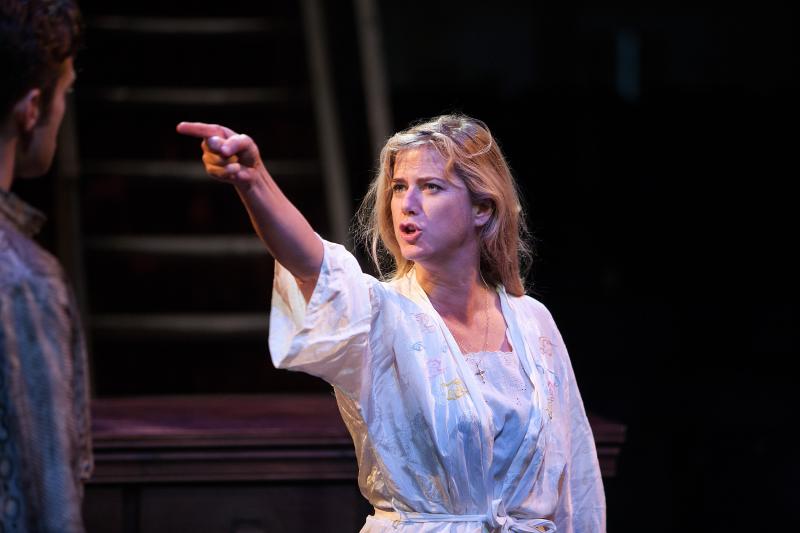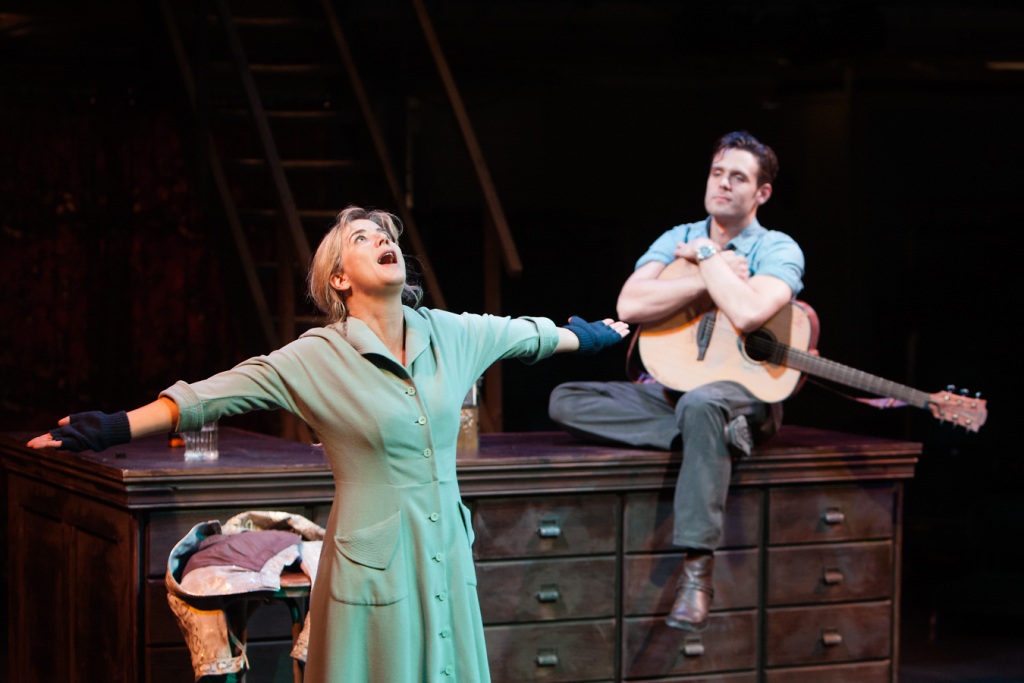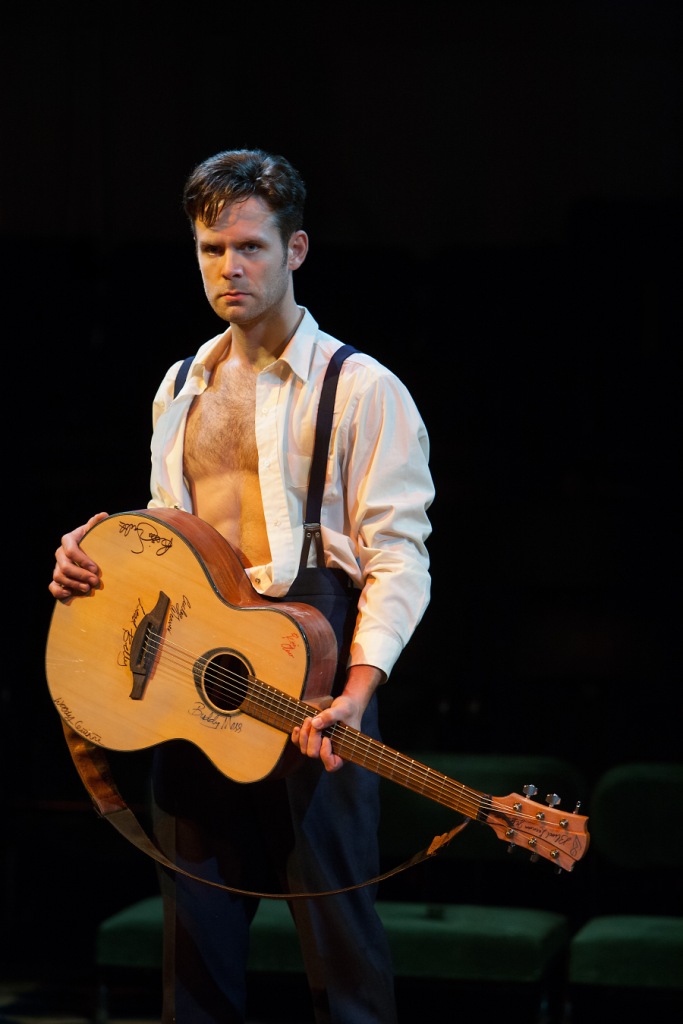Orpheus Descending, Royal Exchange, Manchester | reviews, news & interviews
Orpheus Descending, Royal Exchange, Manchester
Orpheus Descending, Royal Exchange, Manchester
Tennessee Williams' complex classic rewards major revival

Oh, how it’s raining. Streaming down the windows of the dry goods store, Torrance Mercantile, in the Deep South, where Lady Torrance is marooned in a stiflingly small town and a loveless marriage with an awful secret. Depressing. “We’re under a lifelong sentence to solitary confinement in our own lonely skins,” says 30-year-old drifter Val Xavier in his snakeskin jacket, holding onto his only companion in his wanderings, his precious, celebrity-signed guitar.
Life is bleak, but we know there’s escapism – and disaster – waiting to burst out. There’s Lady’s repressed sexuality, smothered by 15 years of self-sacrificing marriage. There’s Val’s held-back energy and desire for love. “My folks all scattered away like loose chickens’ feathers blown around by the wind,” he says. He is musician, poet and prophet of doom. We’re in classic Tennessee Williams territory. Orpheus Descending smoulders from the start. And it’s a slow burn. We’re in racist-riven Clarksdale, Mississippi, in 1957, the year the play opened in New York, having been 17 years in the re-writing since its 1940 premiere in Boston under the title Battle of Angels, inspired by the Orpheus and Eurydice legend.
We’re in classic Tennessee Williams territory. Orpheus Descending smoulders from the start. And it’s a slow burn. We’re in racist-riven Clarksdale, Mississippi, in 1957, the year the play opened in New York, having been 17 years in the re-writing since its 1940 premiere in Boston under the title Battle of Angels, inspired by the Orpheus and Eurydice legend.
As the play begins the “Greek chorus” of the town’s women, who congregate in the Torrance store, gossip against an unseen backdrop that is Klan country, where torchings, lynchings and beatings are commonplace.
Under Sarah Frankcom's direction, this is a powerful and atmospheric revival, with Imogen Stubbs and Luke Norris (both pictured above) in the key roles. Their interaction is pivotal. Stubbs is compelling. She gives a finely modulated and driven performance as Lady. Over an energy-sapping two-and-a-half hours, she moves from being a woman who has given up on life and love to being a touchingly spirited woman re-born, life literally stirring within her once again before tragedy robs her. Stubbs also sustains the difficult accent, not easily comprehensible at first, of an Italian immigrant family. Luke Norris (pictured below left), too, moves from being an apparently heartless charmer – “I can burn down a woman” – to a man who finds love, but pays the ultimate price. The chemistry between them is magnetic.
 There is also a riveting performance by Jody McNee as Carol, the town’s unbalanced slut, a “lewd vagrant” as she calls herself. Temptress, drunk and exhibitionist on the surface, she, too, suffers from inner loneliness and despair. McNee's Carol is a wildcat, showing real passion, even if she does have difficulty of holding onto that southern accent at times. The triangle of Lady, Val and Carol is realised with stunning effect.
There is also a riveting performance by Jody McNee as Carol, the town’s unbalanced slut, a “lewd vagrant” as she calls herself. Temptress, drunk and exhibitionist on the surface, she, too, suffers from inner loneliness and despair. McNee's Carol is a wildcat, showing real passion, even if she does have difficulty of holding onto that southern accent at times. The triangle of Lady, Val and Carol is realised with stunning effect.
Of course, the trouble with Williams is that he packs so much in with character development, plots and symbolism. We know that Lady’s “wop” father was killed when some locals set fire to his vineyard because “he sold liquor to niggers”. We learn that she got pregnant by a man she truly loved, unbeknown to him. “I had it cut out and I cut my heart out,” she says. We know that she then gave herself to an older man. But it is only late in the play, when she is trying to recreate an in-store version of her father’s vineyard, that she and we learn that her dying husband was one of the mob that killed her father.
Death, violent death, is always on hand as these people clutch at life. “Don’t go,” Lady pleads to Val, “I need you to live.” And Val does give her life. But, like Orpheus and Eurydice, their destiny is to have life, having found it at last, horribly taken away.
rating
Explore topics
Share this article
Add comment
The future of Arts Journalism
You can stop theartsdesk.com closing!
We urgently need financing to survive. Our fundraising drive has thus far raised £49,000 but we need to reach £100,000 or we will be forced to close. Please contribute here: https://gofund.me/c3f6033d
And if you can forward this information to anyone who might assist, we’d be grateful.

Subscribe to theartsdesk.com
Thank you for continuing to read our work on theartsdesk.com. For unlimited access to every article in its entirety, including our archive of more than 15,000 pieces, we're asking for £5 per month or £40 per year. We feel it's a very good deal, and hope you do too.
To take a subscription now simply click here.
And if you're looking for that extra gift for a friend or family member, why not treat them to a theartsdesk.com gift subscription?
more Theatre
 Edinburgh Fringe 2025 reviews - Monstering the Rocketman by Henry Naylor / Alex Berr
Tabloid excess in the 1980s; gallows humour in reflections on life and death
Edinburgh Fringe 2025 reviews - Monstering the Rocketman by Henry Naylor / Alex Berr
Tabloid excess in the 1980s; gallows humour in reflections on life and death
 Edinburgh Fringe 2025 reviews: Lost Lear / Consumed
Twists in the tail bring revelations in two fine shows at the Traverse Theatre
Edinburgh Fringe 2025 reviews: Lost Lear / Consumed
Twists in the tail bring revelations in two fine shows at the Traverse Theatre
 Make It Happen, Edinburgh International Festival 2025 review - tutting at naughtiness
James Graham's dazzling comedy-drama on the rise and fall of RBS fails to snarl
Make It Happen, Edinburgh International Festival 2025 review - tutting at naughtiness
James Graham's dazzling comedy-drama on the rise and fall of RBS fails to snarl
 Edinburgh Fringe 2025 reviews: I'm Ready To Talk Now / RIFT
An intimate one-to-one encounter and an examination of brotherly love at the Traverse Theatre
Edinburgh Fringe 2025 reviews: I'm Ready To Talk Now / RIFT
An intimate one-to-one encounter and an examination of brotherly love at the Traverse Theatre
 Top Hat, Chichester Festival Theatre review - top spectacle but book tails off
Glitz and glamour in revived dance show based on Fred and Ginger's movie
Top Hat, Chichester Festival Theatre review - top spectacle but book tails off
Glitz and glamour in revived dance show based on Fred and Ginger's movie
 Edinburgh Fringe 2025 reviews: Alright Sunshine / K Mak at the Planetarium / PAINKILLERS
Three early Fringe theatre shows offer blissed-out beats, identity questions and powerful drama
Edinburgh Fringe 2025 reviews: Alright Sunshine / K Mak at the Planetarium / PAINKILLERS
Three early Fringe theatre shows offer blissed-out beats, identity questions and powerful drama
 The Daughter of Time, Charing Cross Theatre review - unfocused version of novel that cleared Richard III
The writer did impressive research but shouldn't have fleshed out Josephine Tey’s story
The Daughter of Time, Charing Cross Theatre review - unfocused version of novel that cleared Richard III
The writer did impressive research but shouldn't have fleshed out Josephine Tey’s story
 Evita, London Palladium review - even more thrilling the second time round
Andrew Lloyd Webber's best musical gets a brave, biting makeover for the modern age
Evita, London Palladium review - even more thrilling the second time round
Andrew Lloyd Webber's best musical gets a brave, biting makeover for the modern age
 Maiden Voyage, Southwark Playhouse review - new musical runs aground
Pleasant tunes well sung and a good story, but not a good show
Maiden Voyage, Southwark Playhouse review - new musical runs aground
Pleasant tunes well sung and a good story, but not a good show
 The Winter's Tale, RSC, Stratford review - problem play proves problematic
Strong women have the last laugh, but the play's bizarre structure overwhelms everything
The Winter's Tale, RSC, Stratford review - problem play proves problematic
Strong women have the last laugh, but the play's bizarre structure overwhelms everything
 Brixton Calling, Southwark Playhouse review - life-affirming entertainment, both then and now
Nostalgic, but the message is bang up to date
Brixton Calling, Southwark Playhouse review - life-affirming entertainment, both then and now
Nostalgic, but the message is bang up to date
 Inter Alia, National Theatre review - dazzling performance, questionable writing
Suzie Miller’s follow up to her massive hit 'Prima Facie' stars Rosamund Pike
Inter Alia, National Theatre review - dazzling performance, questionable writing
Suzie Miller’s follow up to her massive hit 'Prima Facie' stars Rosamund Pike

Comments
Why the plot spoilers. For
Just exactly what I was